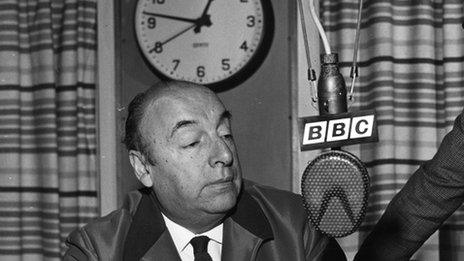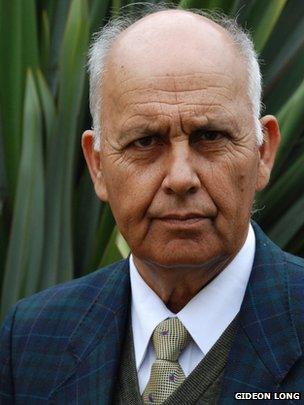Unravelling the mystery of Pablo Neruda's death
- Published
Pablo Neruda's family insists he died of prostate cancer in 1973
The remains of Chile's Nobel Prize-winning poet Pablo Neruda are being exhumed on Monday in a bid to determine the cause of his death after his assistant alleged he was murdered by Gen Augusto Pinochet's military regime, the BBC's Gideon Long reports from Isla Negra.
Pablo Neruda's bones are interred in the garden of Isla Negra, his beloved beach house on Chile's Pacific coast. He is buried next to his wife and muse, Matilde Urrutia.
The poet died aged 69 on 23 September 1973, just 12 days after Gen Pinochet's military coup.
His death certificate says he died of prostate cancer, a view widely accepted for nearly four decades.
But his former personal assistant Manuel Araya says the poet was given a lethal injection in hospital.
Mr Araya says Neruda, a communist, was about to go into exile in Mexico from where he planned to lead the global opposition to the military dictatorship in his homeland.
"Until the day I die I will not alter my story," Mr Araya told the BBC.
"Neruda was murdered. They didn't want Neruda to leave the country so they killed him."
Cancer or poison?
Mr Araya's allegations have been taken seriously. Following an investigation, a judge decided there were sufficient grounds to warrant the poet's exhumation.
The forensic experts who are examining Neruda's remains say they will search for two things above all.
Firstly, they will look for evidence of cancer in the poet's bones. That would suggest the disease was at an advanced stage, and would support - although not prove - the theory that it caused his death.
Secondly, they will look for signs of toxins, the discovery of which would lend weight to Mr Araya's claims.
It will not be easy.
Nearly 40 years have passed since Neruda died and his organs and soft tissue have long since decomposed.
"The passage of time makes our job difficult," said Dr Patricio Bustos, director of Chile's Medical Legal Service, a state body overseeing the exhumation and examinations.
"But on the other hand there have been technological advances over the past 30 or 40 years that can help us."
Forensic dentist and anthropologist Claudia Garrido-Varas says that even though 40 years have passed, there are still things that can be found in the remains through toxicological analysis.
"If poison was used it would depend on the type of poison, the amount used and the number of doses administered."

Pablo Neruda, seen here on a visit to the BBC's Latin American service in 1965, was fiercely critical of the military
No traces
The job of the forensics team has been made more difficult by an absence of medical records from the hospitals where Neruda was treated.
He died in the Santa Maria hospital in the capital, Santiago.
According to newspaper reports from the time, the hospital issued a medical bulletin stating he died of heart failure.
But the hospital says no record of that bulletin remains, and the poet's death certificate makes no mention of heart failure.
A few months before Mr Neruda died, the Chilean media reported that he underwent surgery at another Santiago hospital.
But officials at that hospital say there is no record of that, either.
The judge investigating Neruda's death has even sought medical records in France, where the poet was treated in the early 1970s while serving as Chile's ambassador in Paris.
Nothing has been found.
Mr Araya and the Chilean Communist Party say the absence of such records is deeply suspicious, particularly given Neruda's stature as a Nobel Prize winner and senior diplomat.
Mystery injection
Despite the passage of time, Mr Araya says he remembers clearly what happened in the days after the military coup.

Mr Araya says Pablo Neruda told him he had been given an injection
He says Neruda was admitted to hospital on 19 September 1973, and was due to fly to Mexico on 24 September.
"On the morning of 23 September, Matilde and I went back to Isla Negra to collect some of his belongings," he recalls.
"While we were there we received a phone call from Neruda in the clinic.
"He said 'Come back here quickly! While I was sleeping a doctor came in and gave me an injection in the stomach.'"
Mr Araya says he and Matilde drove back to Santiago immediately. "Neruda died at around 2230 that evening," he remembers.
Matilde Urrutia died in 1985. She always denied her husband died of cancer but never publicly alleged he was murdered.
The Pablo Neruda Foundation, which oversees the poet's estate, insists he died of cancer but says it will cooperate with the exhumation and tests.
Murky history
It would be easy to dismiss the murder allegations as implausible were it not for Chile's recent history.
In 2009, six people were charged in connection with the death of former Chilean president Eduardo Frei Montalva.
Mr Frei Montalva was treated in the same hospital where Neruda died. There, Mr Frei Montalva received routine surgery in 1981, at the height of Gen Pinochet's military rule.
He never came out alive.
An investigating judge ruled he was poisoned with thallium and mustard gas.
In December 2010, the remains of former Interior Minister Jose Toha were exhumed as part of an investigation into his death in 1974.
The military said he had committed suicide by hanging himself in a hospital wardrobe. But in October of last year an investigating judge concluded he was strangled.
It will be several months yet before the forensics experts reach their conclusions about how Neruda died.
Given the poet's standing as one of the great figures of Latin American literature, those conclusions are likely to resonate around the world.
- Published21 March 2013
- Published13 March 2013
- Published23 May 2011